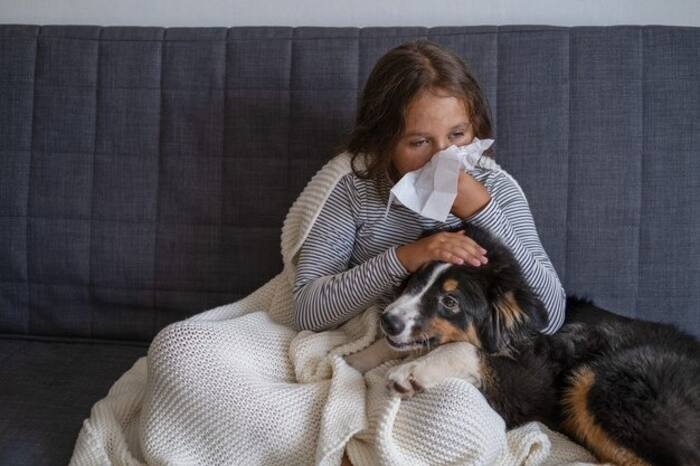While winter can be a wonderful time for pets and their owners, it’s important to consider the potential risks associated with the change of season.
As winter approaches and temperatures drop, pet owners should be aware of the possible allergies their furry companion may face. Increased shedding, dry skin and other winter-related problems can lead to discomfort for both pets and their owners.
What is winter shedding?
Winter shedding in pets is a natural response to the changing seasons. As temperatures drop, animals often grow thicker fur to protect themselves from the cold. However, the combination of central heating systems and the drier indoor air in winter can worsen shedding, leading to a build-up of loose fur and dander around the home, which can contribute to potential respiratory problems and allergies in humans.
Monika Stuczen, research scientist in microbiology at Dyson, says: “The impact pets have in the home goes beyond what we can see. Effectively removing pet hair is important, but pet dander with dried saliva is a problem invisible to the naked eye. These microscopic particles can carry allergy-causing proteins throughout the home. They are light and tiny and can remain in the air or move between objects for hours. Research has even found cat allergens in rooms where cats have never been.”
To ensure the well-being of your pets during the winter, Nitika Ahlawat, a certified dog trainer from The Golden Grey, lists some essential tips to keep in mind when caring for your pets.
Protect your pets from winter allergies with 5 simple tips
Regular care: Whether your dog spends more time indoors in the winter and goes on fewer walks, or spends as much time outdoors as he does in the summer, he will still need grooming. Although it is commonly believed that a dog’s hair needs to be allowed to grow out in the winter to keep it warm, this can be more harmful than beneficial.
The formation of uncomfortable tangles in an uncared for pet can promote the growth of bacteria and germs in the coat, posing potential health risks. However, regular grooming can significantly reduce the number of allergens in your pet’s coat. It helps remove loose hair, dander and external allergens that may have settled on their coat during outdoor activities.
The Dyson Pet Groom tool can make pet grooming less messy and more efficient. It is designed to brush and remove loose pet hair and dander directly into the waste bin. And as you brush, the bristles penetrate your pet’s coat to grab loose hairs for quick and comfortable grooming. Equipped with powerful suction and advanced filtration, Dyson cordless vacuum cleaners are also fully sealed, preventing dust or dander from spreading throughout your home.
Cleaning pet bedding and belongings: Many pets are sensitive to dust mites, which cause symptoms such as red or watery eyes, sneezing and coughing. Dust mites usually thrive on pet dander, hair and dander and are found in carpets, mattresses, beds and sofas. They float in the air, cannot be seen with the naked eye, and are present throughout the home, including the pet’s bedding, toys, and other designated areas. Washing your pet’s bedding regularly removes allergens that may have built up over time.
Keep them dry, especially the paws and ears: After your furry friend plays outside, wipe his paws or gently wash him with warm water. Checking your dog’s paws in winter also gives you a chance to check if there are any bits of gravel or stone stuck between the toes, which if left unchecked can quickly cause pain and infection. It also helps remove dirt and insects they may have picked up from the ground. Use warm water and soft towels to gently clean the paws to ensure a thorough cleaning.
Tick and flea control: As temperatures drop, you may think you can give your pet a break from tick and flea medications. But not so fast: many dogs are at risk of ticks and fleas all year round. Make sure your dog’s sleeping area is clean and free of these pests. In addition to regularly cleaning and drying the bedding, you should also take appropriate tick and flea control measures, as recommended by your veterinarian, to protect your furry friend. Check for possible ticks and fleas more often than in other seasons.
Keep the environment clean: In addition to caring for our pets, it is important to also care for the environment so that our home remains healthy. More shedding means more pet hair, dander and allergens. Vacuum your home regularly to eliminate it completely.
While winter can be a wonderful time for pets and their owners, it’s important to consider the potential risks associated with the change of season. By taking these precautions, pet owners can ensure that their beloved pets enjoy the winter season comfortably and in good health.


